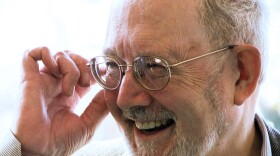Each spring, thousands of proud and impoverished parents watch their children graduate from colleges all over the country. The ceremony is called "commencement," because it signals the beginning of adulthood, financial responsibility, real work, dull parties, and all the other horrors of grown up life. It's a scary time for the graduates, comparable to going over the top in the trench warfare of World War One, and facing the enemy for the first time. That's why the graduate schools are full. These days especially it makes sense to stay out of the firing line as long as possible.
Most universities like to add a little publicity and style to their commencement ceremonies by granting honorary degrees to citizens of varying degrees of honor and distinction. Degrees are just about the only thing a university can afford to give away, apart from obsolete computers and those little bits of chalk that are too small to write with. So they hand out honorary degrees with fine impartiality.
Honorary degrees are a perfect illustration of the principle that "To him that hath shall be given." Some celebrities have dozens of them. But people who could really use an honorary degree - the poor, the obscure, or the intellectually challenged - have to get their diplomas the hard way.
The principle of the honorary degree could usefully be extended. Right now, it's no more than a public relations exercise. But consider the vast savings of time and money that could be achieved by handing out degrees more liberally. Some students who arrive in college are so bright, and so motivated, that they might just as well be given a degree at the end of their first year, saving three years of wasted time and a monstrous heap of dollars. In the eighteenth and nineteenth centuries, it wasn't unusual for the most gifted young men to graduate from Oxford or Cambridge at the age of sixteen. The professors simply had nothing more to teach them. We still have students like that today, but they have to plod through the whole four years to satisfy the regulations.
On the other hand, some students are so obtuse and lazy that they will never earn a legitimate degree in a hundred years. To save everybody a lot of grief they should be given honorary degrees too - preferably at the end of the first week of their freshman year.
This is, alas, a rational argument, and nobody loves a rational argument. When it comes to things like graduation, we prefer to follow tradition. The college experience must have a fixed beginning, middle and end, the same for everybody. It's like the speed limit. Some drivers are perfectly safe at eighty on the highway, others should never be allowed to go faster than twenty miles an hour, and some should just stay at home. But we all have to drive at fifty five.
I suppose we need to know what the limits are. In particular we want to know when something will end, like a family dinner or a prison sentence. Yet commencement, as the name implies, is not really the end of anything. It’s the beginning of another kind of education that will go on and on, rather like Wagner’s Ring Cycle. Like it or not we keep on learning as long as we manage to keep on living. It’s just that, at that final graduation, and no matter how much we have learned, nobody will give us a diploma.
Copyright: David Bouchier






